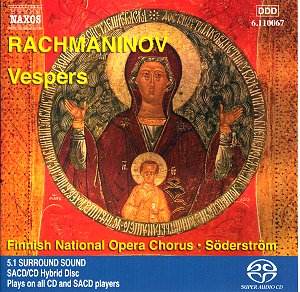A frustrating performance: its not inconsiderable strengths,
which make a positive effect early on, are gradually offset
by equally obvious and increasingly irritating shortcomings
as matters proceed.
Eric-Olof Söderström has some good ideas about how this
music should go. Interpretatively, he avoids both the unrelieved
passionate intensity of the Russian school and the all-purpose
"devotion" of Western practitioners, drawing plenty
of character from each number at relatively brisk speeds. Blessed
is the man (track 3) has an attractive undulating scansion;
the phrasing of the Troparion of the Resurrection (track
9) in short, dramatic segments compels attention immediately.
The concluding sequence (tracks 13-15) is nicely contrasted:
the first Troparion is appropriately awe-filled, the
second dramatically reflective, and there's a joyous lilt to
the closing Kontakion - although, as we shall see, it
has other problems. The Finnish National Opera Chorus sings
with a bracing urgency of attack and welcome rhythmic clarity;
balances are good, with important midrange lines drawn in sharp
relief.
The chorus's principal strengths are its female contingent
and - surprisingly, from a non-Russian group - its basses. The
women sound lovely and vibrant on their own ... or when supported
by the tenors, which produces a similarly high, light texture.
They especially shine when the writing splits them into three
or more parts, where their clear, well-tuned etching of the
lines allows Rachmaninov's rich harmonies to make their full
expressive effect. And the basses prove - if you'll pardon my
oxymoron - fully up to their low tessitura. They don't offer
the buzzy, rumbling resonance of the home-grown Russian variety,
but neither do they weaken in exposed descents (as in Bless
the Lord, O my soul, track 2), retaining sufficient tonal
weight to make their presence felt on the low pedal points.
Their occasional thematic passages, such as the long melody
of the Hymn of Thanksgiving (track 11), are shapely,
with good legato and an attractive, burnished tone.
But, for all the excellence of its individual sections,
the chorus as a whole is less impressive. The inner voices sound
less carefully tuned than those above and below, so the sonority
turns woolly as the textures thicken. Thus, intonation is iffy
in the full multi-part chords of Gladsome light (track
4), but improves markedly as the texture tapers to just two
parts. After the nice interplay between the upper and lower
voices in Having beheld the Resurrection (track 10),
the two groups are hard-pressed to match pitch when they converge.
And the final Kontakion is a dead loss, for all its lilt:
at this speed, these singers can't zero in on the tonality,
and the tuning is all over the place.
Even the engineering is spotty: the lovely, church-like
ambience of the lighter passages becomes overbearing and hard-toned
at the climaxes. I was only able to hear this "compatible"
SACD in normal frontal stereo, so perhaps its surround-sound
layer ameliorates the problem.
Stephen
Francis Vasta

![]() Raissa Palmu (soprano)
Raissa Palmu (soprano)![]() NAXOS 6.110067
NAXOS 6.110067
![]() [54.00]
[54.00]